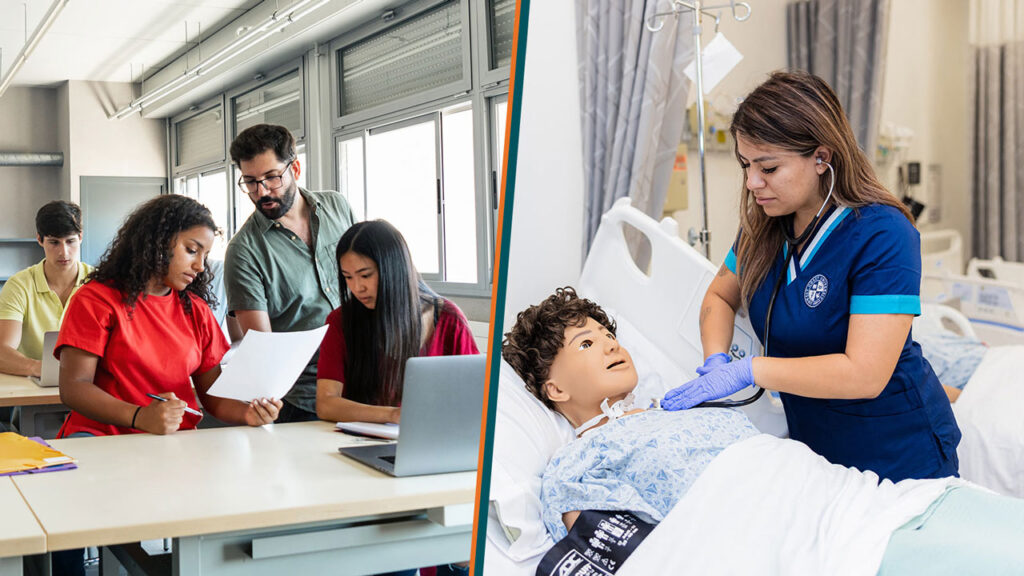Study Buddy: How to Balance Studying with Your Mental Health Counseling Practicum or Internship
If you are enrolled in a Master of Science in Mental Health Counseling program, you will be required to complete a certain number of hours of clinical experience, which will be through the form of a practicum course or internship. This will give you valuable experience interacting directly with clients and licensed mental health counselors, which is critical for preparing you for your future career.
While this is an exciting time, it can also be stressful as you figure out how to juggle your clinical experiences with your regular coursework and personal life. To help you find the right balance, below are some tips for you to consider.
1. Create a schedule and stick to it.
A mental health counseling practicum or internship will be demanding on your schedule, so you need to prepare for it in advance. Be strategic with your time by looking at your weekly practicum/internship schedule and planning study time around those hours.
Put blocks of time on your calendar that are dedicated solely to completing coursework and studying and try to adhere to that plan as much as possible. When you start making exceptions on a regular basis, you lose momentum and may start falling behind in your coursework.
And make sure to be realistic about what you can accomplish so you don’t burn yourself out and get discouraged. For example, you may need to account for travel time or simply time to unwind so you can get into the right headspace for transitioning into schoolwork and vice versa.
If you’re a visual person, try putting up a physical calendar that is marked up with your fieldwork and study schedules. It may also be helpful to set alarms on your phone as a reminder.
2. Consider an online mental health counseling program (if you have not chosen a program yet).
Online mental health counseling master’s programs tend to provide students with increased flexibility in their schedules. Not only do they get to skip the commute to campus, but they are also oftentimes not confined to set class hours, which means they can watch lectures and complete assignments at times that make sense for their own schedules (i.e., they may choose to complete their course activities at night instead of during the day).
If you have not already started a program, you may want to consider one that is either fully online or partially online (“blended”), which will give you greater flexibility in the days and times you can choose for your practicum or internship hours.
3. Choose a practicum site that is close to home or campus.
While you don’t want to limit your opportunities by only considering local practicum and internship sites, choosing a location that is closer to home or campus may help you cut down on commuting time, which allows you to dedicate more time to your coursework. If you happen to find a nearby site that meets the requirements of your program and aligns with your interests, it’s a win-win situation!
4. Ask for help.
Remember that you are not in this alone. If you’re in a good graduate program, you should have access to professors and advisors who genuinely want to help you succeed. Turn to them for advice on how to best maximize your time when you’re trying to balance schoolwork with your clinical experiences. You can also speak with your practicum or internship supervisor for general advice or help possibly adjusting your schedule, if needed.
And don’t forget about any other support systems you have in your life. You may want to ask family members or friends if they can assist with personal responsibilities (such as lending a hand with your kids if you’re a parent) to help free up your schedule.
5. Take care of your physical and mental health.
If you want to have the stamina to complete all your responsibilities (such as school, and internship, and maybe even a job on top of that), you need to make sure you’re investing in your physical and mental health.
Eat healthy meals and snacks, get at least seven hours of sleep a night, and get some exercise so your body is ready to put in the grueling work of studying and clinical hours.
And make sure to give yourself some downtime! Take regular breaks during your study sessions and schedule in some time to do something relaxing that you enjoy, whether it’s a nap, a hobby, or just spending some time with family and friends. If you feel this is impossible to do, start small work 10- to 15-minute breaks to disconnect and decompress.
Clinical Practicum & Internship Experiences at WCU
At West Coast University, students in our MS in Clinical Mental Health Counseling program are required to complete 135 hours of clinical supervised practicum and 600 hours of internship (which do not count toward the hours they must complete post-graduation and pre-licensure as a licensed counseling professional intern or associate).
Because we believe in setting up our students for success, we provide them with the highest level of support through every aspect of their program, including their clinical experiences. Read about WCU’s counseling practicum and internship support.
You can also get more study tips on our blog.
WCU provides career guidance and assistance but cannot guarantee employment. The views and opinions expressed are those of the individuals and do not necessarily reflect the beliefs or position of the school or of any instructor or student.



